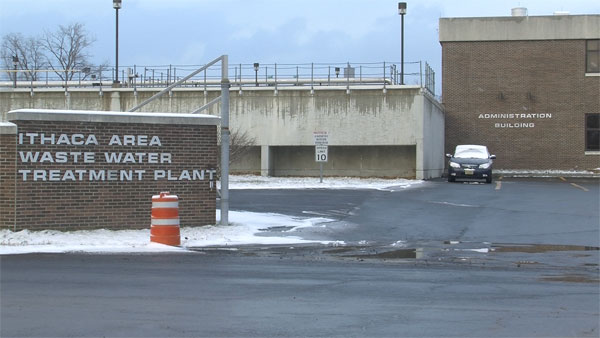The largest dumping of unknown chemicals into the City of Ithaca’s public sanitary sewer system in recent memory occurred Nov. 23, forcing the Ithaca Area Waste Water Treatment Facility to shut down from Nov. 25–27.
The Ithaca Police Department is currently investigating who is responsible for the dumping. Erik Whitney, assistant superintendent of the water and sewer division of the Ithaca Department of Public Works, said an unauthorized tanker or warehouse likely was responsible for the dumping because the volume of the chemicals rules out residential dumping as the cause.
Whitney called for Ithaca residents to report any suspicious activity involving tankers or chemical dumping, and to contact the police to report any tips they might have. Whitney said whoever dumped the chemicals will be fined by the New York State Department of Environmental Conservation.
Dan Ramer, the chief operator at the wastewater treatment facility, said the colorless, odorless chemicals killed many of the microbes in the treatment facility’s wastewater sanitation vats, greatly reducing the efficiency of the sanitation process. He said the facility had no way to prevent the chemicals from passing through the water system.
Ithaca’s drinking water, which comes from Six Mile Creek, was not affected at any time by the chemicals. The sewer system transports wastewater through the facility, which deposits the cleaned water into Cayuga Lake.
Ramer said the microbes were reduced to such an extent that the facility, which processes roughly 6–7 million gallons of water a day, had to shut down operations for three days. On Nov. 26, rainfall exacerbated the problem, causing more water than usual to pass through the facility without being cleaned, he said.
By Nov. 29, the microbes had repopulated enough for the facility to return to normal operational conditions, Ramer said.
“That’s the good news about the microbes; they’re very resilient,” Ramer said. “They come back on their own. All we did was give them enough oxygen and food and take care of them. Slowly but surely, the ones that weren’t damaged or impaired recovered.”
He also said there was no damage to the infrastructure of the Ithaca sewer system or the facility itself.
The exact nature of the chemicals is unknown, but Ramer said the most likely possibilities are ammonia, brine or some sort of industrial chemical. He said this was the first major chemical emergency that caused the wastewater treatment facility to shut down in Ithaca’s history.
“We don’t have any heavy industry in this community,” he said. “Nothing like this has happened in the five years I’ve been here, and nobody that’s been here longer than that remembers anything quite like this.”
Though Cayuga Lake did not suffer much pollution, sophomore Erika Bucior, president of the Ithaca College Environmental Society and an environmental studies major, said the need to preserve the lake’s biodiversity is important for the Ithaca community.
“Even a minor amount of eutrophication or having those different, unknown chemicals dissolved in the water affects oxygen content, which can kill off the different species of fish and all the different microbes and plants in the water,” Bucior said.
Ramer said the cold weather and high level of dilution of the wastewater made any effects on the lake’s ecology negligible.
“We’re not in the business of polluting Cayuga,” Ramer said.
Whitney said the department is considering keeping one of the three microbe vats isolated to allow for faster repopulation of the microbes if another emergency arises.
Also, new monitoring equipment will allow operators to detect chemicals that could jeopardize the microbes, he said.
Ramer said the Water and Sewer Department has agreements with all organizations with licenses to purchase industrial chemicals that allow the department to inspect all facilities that use chemicals. He said licensed organizations are required to alert the facility if they release chemicals into the sewer system. Failure to alert results in a fine.
Nevertheless, Whitney urges Ithaca citizens to be careful they don’t pour large amounts of disinfectants and anti-bacterial chemicals, which can kill the facility’s microbes, down the drain.
Bucior said the spill is a significant chemical problem, and the community needs to know if there are any risks whenever an emergency like this one threatens the lake so people using the lake for recreational purposes can remain safe.
“It’s the public’s right to know, even if it doesn’t cause a significant amount of damage or it doesn’t affect them in a significant way,” Bucior said.







